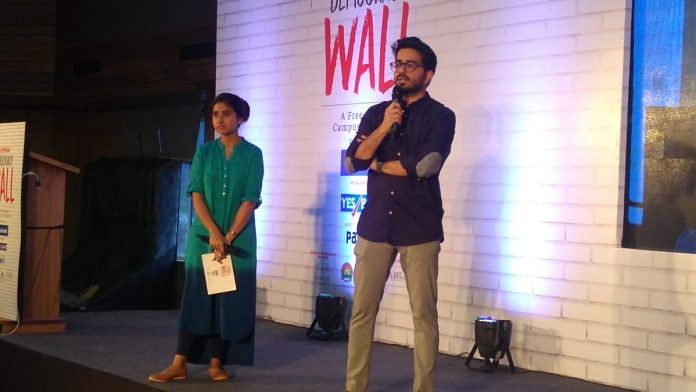Youth Ki Awaaz founder explained the need for citizens to share their stories and bring important issues to light, when the mainstream media fails at it.
Anshul Tewari, founder and editor-in-chief of user-generated content platform Youth Ki Awaaz said Wednesday that traditional media has failed to do its job, putting more responsibility on citizens to ask more questions.
“The traditional media has terribly failed at doing the core job that they’re supposed to do. It’s now dedicated more towards the people in position of power,” he said. Tewari talked about the lack of coverage of social and environmental movements in the media.
The media entrepreneur said that he conceived the idea of Youth Ki Awaaz (YKA) at the age of 17. At that age, Tewari said he had already realised that common people had ideas and stories that needed to be shared, but were not being covered by the mainstream media.
“The media was extremely top-down, deciding what the rest of the country should be consuming,” he said at the sixth edition of ThePrint’s Democracy Wall, held in Meghalaya.
Democracy Wall is a free-speech campus initiative. This edition was held at North-Eastern Hill University in Shillong. Other guests at the event included Meghalaya politician James K. Sangma, rapper Kehko Thiamkho, actor Nimrat Kaur, ‘constitutor’ Meghnad, comedian Abhineet Mishra, and Patricia Mukhim, editor of Shillong Times.
How to tell a story as a citizen
Tewari clarified that he didn’t expect citizens to put themselves in danger in order to report a story like a journalist, while answering the concerns of an audience member about the safety of a citizen willing to tell a story. However, he encouraged people to initiate conversation about important issues.
“You want to say something, say it. Don’t wait for a journalist to go out and say it. Because if enough people start talking about it, it will actually create a media narrative for tomorrow, which the media has already done in the past,” he said.
On tackling fake news
Tewari confessed to the audience that YKA also faces the problem of fake news.
“We get 300 to 400 stories a day. Out of these, one or two end up being fabricated stories,” he said.
On the ethicality of “click-baiting”
Tewari considers ‘click-bait’ journalism as fake.
However, he gave the example of an American media website ‘Upworthy’ that started with an idea to highlight important issues that weren’t getting noticed by mainstream media.
“Their reasons for click-baiting are very different. But the people spreading fake news learnt a lot from it,” he said.
He concurred that click-baiting became prominent on news media platforms like Facebook. This posed a problem as it undermined “authentic narrative”. Tewari said that the evolving consumption of content will eventually weed out this problem.



